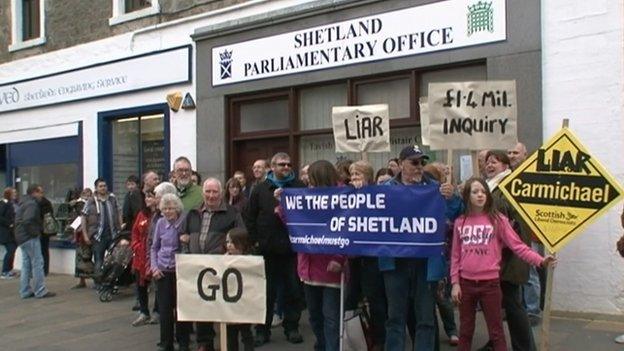Can Alistair Carmichael's election be overturned?
- Published

Alistair Carmichael has been Orkney and Shetland Mp since 2001
An online appeal to raise funds for a legal challenge to the election of Orkney and Shetland MP Alistair Carmichael has raised more than £42,000 in four days.
The People Versus Carmichael, external was launched on crowdfunding site Indiegogo by "residents of Orkney and Shetland who are disappointed in the behaviour of their MP and want our politics conducted honestly and without smears".
Its stated goal is to "raise an election petition in the courts". It says: "This could begin a process which could have the recent result in Orkney and Shetland overturned."
Why are they doing this?

There have been protests in Mr Carmichael's constituency
Mr Carmichael has been the Liberal Democrat MP for Orkney and Shetland since 2001.
Before the general election he was Scottish secretary, a cabinet minister in the UK government.
It was a position of power and influence that gave him access to confidential government documents.
On 3 April, during the election campaign, the Daily Telegraph reported a leaked memo which gave an account of a private conversation between Nicola Sturgeon and the French Ambassador which suggested that the SNP leader wanted Tory leader David Cameron to remain prime minister.
Ms Sturgeon denied the account and demanded an inquiry into the leak.
The Cabinet Office inquiry concluded that Mr Carmichael and his special advisor Euan Roddin were responsible for the leak.
When asked about the leak at the time, Carmichael said: "The first I heard of this was when I received a phone call from a journalist".
In a letter of apology, Mr Carmichael said: "Had I still been a government minister I would have considered this to be a matter that required my resignation. I have therefore informed the Cabinet Secretary that I will decline my ministerial severance payment."
For many this sanction is not enough and they feel he is not fit to be an MP.
Those behind the crowdfunding petition says they want to hold Mr Carmichael "accountable for his behaviour before, during and after the election campaign".
How are they going about this?
They are hoping to raise enough money for a legal challenge under the Representation of the People Act 1983.
It states that electors or disappointed candidates can question the result of a parliamentary election if a candidate or their agents engage in "corrupt or illegal practices".
The practices set out in the act include bribery (making illegal payments) and paying canvassers.
Whether Mr Carmichael's actions are covered by "corrupt or illegal practices" is the matter a court would have to decide.
Have there been previous cases?
Last month the election of the Mayor of Tower Hamlets, Lutfur Rahman, was voided for a range of breaches of election law including voting fraud, false statements, bribery and spiritual influence, telling Bengali voters it was their "religious duty" to vote for him.
However, the case of Labour's Phil Woolas in the 2010 general election is perhaps more relevant.
He was removed from his Oldham East and Saddleworth seat for circulating lies about the personal character of his Liberal Democratic opponent during the general election campaign. He was the first MP to lose his seat in this way for almost a century.
The specially convened election court ruled that comments in campaign material suggesting Lib Dem candidate Elwyn Watkins had tried to "woo" the votes of Muslim extremists clearly amounted to an attack on his personal character and conduct.
Section 106 of the Representation of the People Act states that a person who "makes or publishes any false statement of fact in relation to the candidate's personal character or conduct shall be guilty of an illegal practice, unless he can show that he had reasonable grounds for believing, and did believe, that statement to be true".
Alistair Carmichael, who won the Orkney and Shetland seat with a majority of just 817 votes, says he believed at the time that he authorised the leak that the comments made about Ms Sturgeon in the memo were a true account of her conversation.
Christine O'Neill, chairman of Brodies LLP and expert in public law, told BBC Scotland: "One issue here of course is that the first minister (Nicola Sturgeon) was not a candidate in this election.
"The false statement must have been made with the aim of influencing the outcome of the election - and in order to see the successful candidate unseated it is also necessary to show that there was an actual impact on the outcome of the election.
"There are few election petitions and fewer which are successful. One of the most recent cases on false statements makes it clear that there is a distinction between saying something false about a candidate's personal conduct and character and making false statements about their political activities or conduct."
What about the power to "recall" an MP?
In the months before the end of the last parliament the Recall of MPs Act 2015 was given Royal Assent.
It allows for a recall petition to be triggered if a MP is sentenced to a prison term or is suspended from the House of Commons for at least 10 sitting days.
If 10% of the eligible electors in the MP's constituency signed a petition, the seat would be declared vacant and a by-election would follow.
Mr Carmichael has not been convicted of a criminal offence or suspended from the House of Commons so this new law would not apply unless those criteria were met.